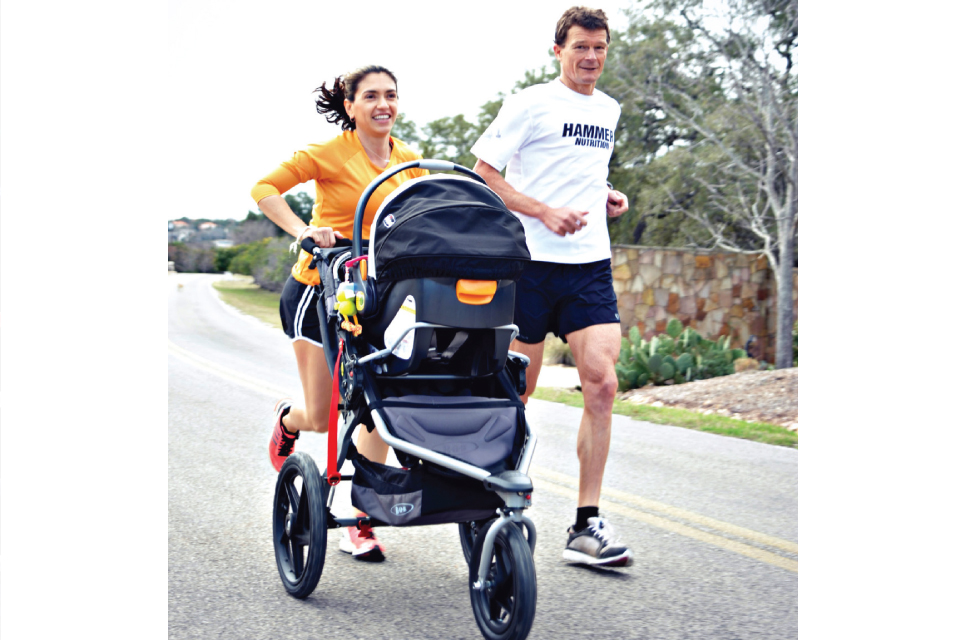Triathlete and Father

A few months ago, my wife Illiana and I had the most significant and joyful change to our lives: We became parents. Our son Pablo was born and, for the next 20 years or so, he will be with us most of the time.
My perspective on triathlon training has changed a bit now that I am a father. There is obviously much less time to train, and my workout schedule is different now. But, more importantly, my view on why I train and race is different.
Here’s what has changed about training.
- Quality: With much less time to train, my workouts are generally a lot shorter. However, I keep the intensity and quality higher, which works well because of the lower volume (except on those days after a night with hardly any sleep).
- Flexibility: If you were used to a very rigid and structured training setup, let it go! As a father, your child(ren) and family have to take first priority. There are more and more occasions where I have to skip workouts or shuffle things around. The main point is not to get frustrated or discouraged if you have to skip a workout. It’s for a good reason. Move on, and do a little extra work when there is more time.
- Efficiency and Time Management: I used to train after work on most weekdays. Now, I hardly ever do a workout after I leave the office because I want to get home to see Pablo’s smiles and hear his giggles. Instead, I get up to squeeze in an early morning workout or I find time at lunch. Workouts are shorter but, with more efficient use of my time, I can still fit something in each day.
- Family Workouts: Sometimes, the actual training effect of a workout is secondary—what’s more important is to enjoy and combine it with family time. For example: When my wife and I run with the baby stroller, pace does not matter. We just want to have a good time together, and the main “training objective” is to entertain Pablo. When I meet Illiana and Pablo for coffee or pizza at the end of a Saturday morning ride, I don’t care about a brick run off the bike; finishing up and spending time together is more important.
What has changed about my perspective on triathlon training and racing?
As a father, I have become more conscious about some of the things that make triathlon training and racing fun. These are mostly related to the “triathlon lifestyle” and are less so about specific workouts or races. I expect that getting children involved with and exposed to this lifestyle will be fun, and there are many opportunities for a child to benefit from having such exposure through active moms and dads.
As fathers, we are—at some point—role models for our children. Showing passion for working out and an active, outdoor-oriented lifestyle is something great to pass on to our offspring. These days, when kids at very young ages seemingly addicted to technology, staring more at screens than at anything else, and enjoying too much passive entertainment, triathlete fathers have a great opportunity to demonstrate enjoyment of an active life that includes swimming, cycling, and running.
It can be challenging, what with sugary snacks and fast food everywhere, to keep a child excited about healthy nutrition. We triathletes eat (for the most part) a healthy and balanced diet. Our children will observe this regime and be more likely to follow the same habits.
Parents are excited to teach children skills and values in life, and I expect that being an active triathlete will give me many unique opportunities for to do so. Aside from teaching our children physical and nutritional skills, we can, for example, show that dedication and consistency lead to results and help achieve goals, and that training and racing provide unique opportunities to make friends.
In addition to the benefits of being a “triathlete father,” there are some possible pitfalls. Don’t become obsessed with trying to have your child enjoy the same hobby. I’m planning to get Pablo involved and show him my passion for the sport but, if it turns out that he enjoys playing soccer or tennis more or he wants to pursue different activities, so be it. He can still learn from observing what it means to be passionate about a sport, and we can still follow a healthy and an active lifestyle together.
I do believe it’s important for kids to participate in team sports and learn the dynamics of being and playing on a team. Triathlon, though a wonderful sport, does not provide this opportunity. Keep in mind that steering your child in one direction—whether toward triathlon or another preferred sport—can be limiting.
For more of Schwarze's tips on structuring workouts, read "Prioritization in Triathlon Training" and "Gray Zone Versus Black and White"






